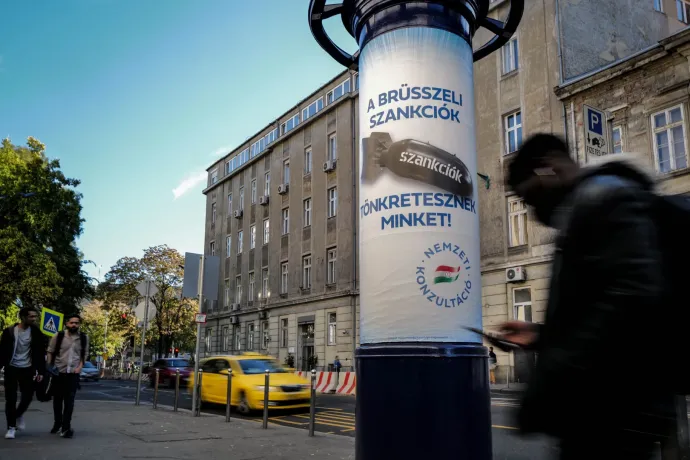
Posters reading "Peace requires strength" and "The sanctions of Brussels are ruining us" flooded the streets of Hungary on Tuesday morning. The advertisements promoting the national consultation depict the EU sanctions on Russia as a bomb.
An image encouraging people to fill in the national consultation on sanctions appeared on the government's official Facebook page on Saturday. The “Brussels sanctions” are visually depicted by the government as bombs, which it claims will "destroy us". It was not clear until recently whether the cover image, published online, would be turned into a poster campaign.
We will leave it to our readers to decide whether the association used by the government is tasteful or not. For now, let us examine the background of this brutal communication.
Gas is expensive indeed, but why?
The European Union's sanctions policy has been heavily criticised by the Hungarian government for some time, with Orbán claiming that the EU's imposition of economic restrictions on Russia in response to its aggression against Ukraine is the source of all our problems. Energy sanctions in particular are thought to be a major blunder, according to the government's narrative "a dwarf has imposed sanctions on a giant" (in respect to energy), and this is causing gas and electricity prices and food prices to soar.
The problem with this argument is that neither food commodities nor gas or electricity are directly subject to sanctions. Until now, the EU has banned Russian coal imports, and from the beginning of next year, Russian oil imports will also be banned, except for certain countries such as Hungary. Natural gas (and through it electricity, and partly food due to fertiliser production) is becoming more expensive because Gazprom is restricting supplies to Europe, with transfers on Nord Stream 1 virtually stopped.
Despite this, the government keeps claiming that the rise in gas prices is caused by the sanctions; the correlation between the two, however, can only be indirect at best, and it cannot be proven.
We do not know what the Russians would do if the EU lifted the sanctions, but military aid to Ukraine, for example, would continue to come from NATO and EU Member States. They have the gas tap, and if they feel like blackmailing us on the logic of economic warfare, they can do so for whatever reason. There has also been no public promise from the Russian side as to exactly on what conditions they would be willing to continue to supply the same amount of gas as before.
On this issue, Russian President Vladimir Putin said on Friday that he believed "Germany is making a mistake by putting its loyalty to NATO before its national interests". He also said that Russia could still pump gas to Germany through the Nord Stream pipeline, "but this decision is not up to the Russians".
Also important is the point that the price surges and other economic difficulties Europe is now facing did not start with sanctions, let alone with the war. All the signs are there that the Covid epidemic coincided with the end of an extended period of prosperity in world economy, and that we are now entering a period of sobering up – blaming all our woes on one factor is by no means an accurate diagnosis, nor one that will take us forward.

They approved all sanction packages
The other interesting thing about the harsh government criticism of sanctions is that the Hungarian government has voted in favour of all the sanctions packages so far. Lakmusz has also collected what was said after they were given the nod:
after each package, they were quick to say that they had "managed to protect Hungarian interests".
This seems to be somewhat contradicted by the Hungarian government's recent rhetoric claiming that the sanctions will ultimately completely destroy the European and especially the Hungarian economy. In fact, they also claim that Russia has benefited from the sanctions – which raises the intriguing question of why they are then lobbying for them to be lifted.
Economic sanctions generally take a few years to have a real impact, not a few months. This doesn't mean they don't work at all in terms of the war (as the Hungarian government is claiming): Russia is already in recession, while the European economy has actually grown this year, and
analysts predict that the Putin regime's ability to finance the war will be seriously weakened in the foreseeable future. As the war drags on, this is an increasingly relevant point to consider.
The devastating effects of the sanctions may, of course, be somewhat offset on the fiscal side by increased revenues from expensive natural gas, as we have seen over the summer. But here Russia is also restraining itself by cutting back on deliveries: if it sends less gas to Europe, the price will be very high, but sales volumes will remain low, and if it sends a lot, it will drive the price down.
It hurts now, but may be good later – still, the Hungarian government is in the worst position
At the same time, Europe has indeed found itself in an unexpectedly difficult situation with the loss of Russian gas, but learning from mistakes could contribute to building a more diversified European gas import base in the years ahead. Analysts say that the positive effects of these efforts could be felt as early as next autumn, in the form of normalising prices and greater energy security.
Of course, all this is hardly a consolation for the Hungarian government: as the country most exposed to Russian gas, it is also forced to buy it at terribly high prices, which completely collapses the balance of foreign trade.
This is also one of the main reasons behind the dramatic devaluation of the forint, which indeed worries many and is fueling inflation; the Orbán government thus feels that it would be politically advantageous to blame their predicament on someone else. The scapegoat is once again Brussels and the sanctions – and this time, portrayed as a bomb.
The questions for the national consultation against the sanctions – formulated to the usual standard, with directed questioning and one-sided explanations – have been available to the public since yesterday, and the mailing of questionnaires has begun. The result is likely to be as usual, with the majority of respondents filling it in exactly as the government intended, but whether this 'democratic' mandate can be a trump card in lobbying the EU is questionable at the very least.
The Hungarian government is by no means the only critic of sanctions policy in Europe, but it is a unique phenomenon that a government which voted in favour of the sanction packages should later take such a hard line against them.
For more quick, accurate, and impartial news from and about Hungary, subscribe to the Telex English newsletter!
The translation of this article was made possible by our cooperation with the Heinrich Böll Foundation.